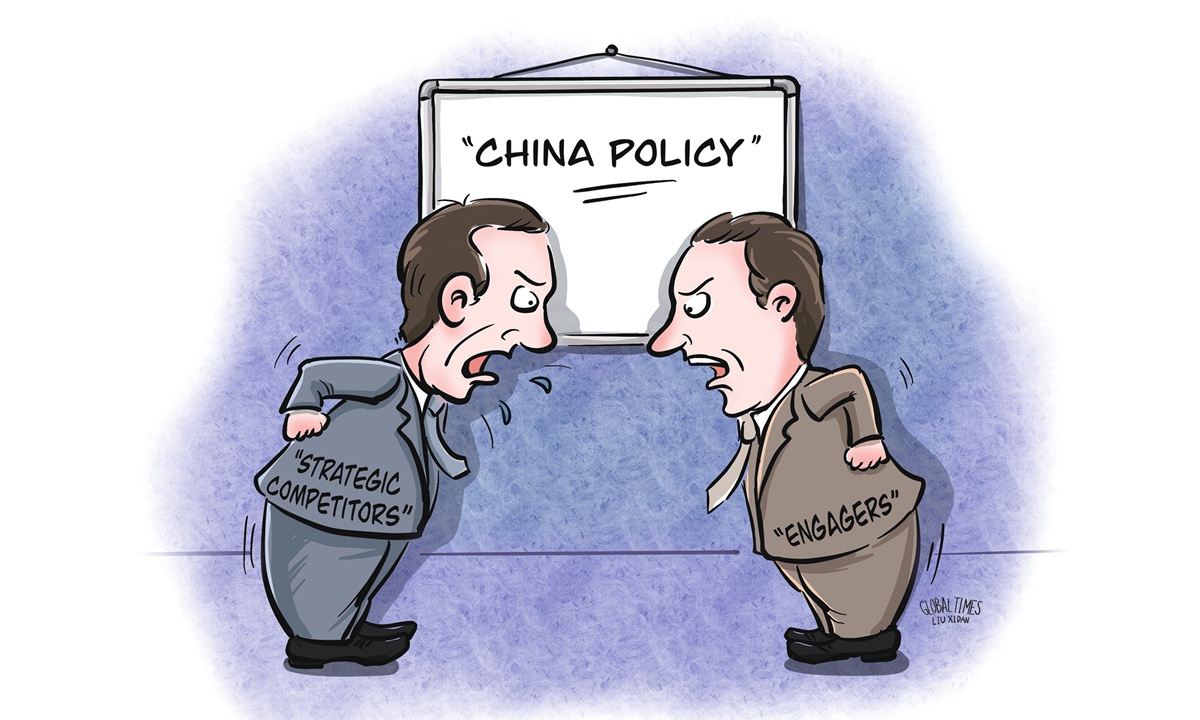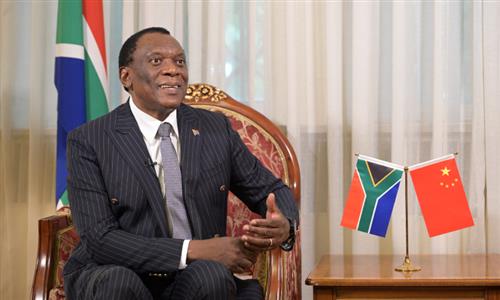Animosities between ‘strategic competitors’ and ‘engagers’ lead to stagnant politics

Illustration:Liu Xidan/GT
Editor's Note:The US policy toward China has undergone drastic changes in recent years. The previous "engagement" policy attempted to bring China into the international system dominated by the US; but now the US is pursuing "strategic competition" to contain and check China. How to interpret the policy change? Why has the US policy toward other major countries not undergone such a dramatic change compared with its policy toward China? Global Times (GT) reporter Wang Wenwen spoke to David McCourt (McCourt), an international political sociologist and associate professor at the Department of Sociology, the University of California-Davis, who has been studying the US' China policy, on these issues.
GT: In one of your articles, you noted that the change in US policy toward China shows a fundamental shift in the composition of officials dealing with China affairs in the US government, as it absorbed a group of scholars referred to as "strategic competitors" by you. What are the differences between these "strategic competitors" and the previous group known as the "engagers"?
McCourt: What I was trying to do was to understand how Donald Trump achieved a very swift change from the prior approach toward China that had been in place since Nixon, with some changes. I thought that the change must be to do with the kinds of people that have gone into the administration alongside, obviously, Trump himself. He's a very important figure in this story. I know that Trump closed the White House door on a group of individuals that had been in key positions of influence all the way back into the 1990s. I call them the engagers, like Kenneth Lieberthal, Jeffrey Bader and Susan Shirk. Broadly speaking, they continue to think that despite key differences of opinion between Washington and Beijing on really important issues, it's in the American national interest to try to talk to China, cultivate important people-to-people exchanges and keep lines of communication open so that we can still trade with China. It's not really about coming together and being best friends, but simply talking to one another.
The strategic competitors are people like Matthew Pottinger, Aaron Friedberg and Michael Pillsbury. They think that the US and China are locked in a long-term, geostrategic competition over influence around the world. They interpret China's activities across the world from a military, economic or geostrategic perspective. They view the Belt and Road Initiative as an attempt by China to expand its influence in countries in Africa and the Global South. They think that China has been competing with the US for the last 30 years, and we haven't woken up to this fact, and it's up to them to really wake America up to the fact that we are in a competition with China.
GT: Besides these two groups, you also mentioned the New Cold Warriors and the Competitive Coexisters. How are these four groups related?
McCourt: Broadly speaking, the New Cold Warriors tend to be an older group. They have been China skeptics for a long time, even going back to the 1980s and early 1990s, and some of them are former military and intelligence personnel, and others are like Steve Bannon who have recently turned their attention to China, and tend to be more senior, and distant from policy. Some other New Cold Warriors are not distant from policy and are very much interested in human rights, like the National Endowment for Democracy kinds of people.
The competitive coexistence people are slightly different, because they tend to be more policy-focused, younger China watchers compared to the engagers. They see eye to eye with the engagers, but they sit in between the engagers and strategic competitors. They accept that competition is the master framework within which US policy toward China is going to be made for the foreseeable future. They don't want to call themselves engagers because they realize that they've got to stay relevant, if in case they get a chance to go into government. Jessica Chen Weiss is the classic example. She thinks of herself as someone who might be able to inform policy in the future, so there's no point saying that we're not in a competition, but if we accept that we are in a competition, then let's think about how we can compete and coexist. Jake Sullivan would sit in between the strategic competitors and competitive coexisters.
If you actually talk to a China watcher in Washington DC, you'd be able to look at them either firmly in one group or at the margins of one of these groups.
GT: You said in an article that in addition to Trump being elected and the rise of China, the factors that led to the US' major shift in its attitude toward China are, more importantly, professional status competition and personalization within these experts. But you also said that personal disputes are not a new phenomenon in China studies. Why did this kind of competition and sentiment erupt during the Trump administration, and have such a big impact on the US policy toward China?
McCourt: One of the things that distinguish America's China expert community is what they think about China, how they think about China, how they create knowledge about China and how they think of themselves as knowledge producers. Professional status competition is a struggle among American China experts that created these two groups. There is struggle of not just ideas about China, but also ideas of what it means to be a China expert. If you look at the engagers, they were very much all sinologists in many ways. They went to universities and got PhDs in China studies. They speak Chinese, they have a very long history engaging with China in many ways. They've spent a lot of time in China. They have good friends in China.
For them, their professional status as a China expert is tied up with engagement, whereas the strategic competitors are actually very different. Mostly, they are focused on military and security matters. Often, they don't speak Chinese. They haven't spent a lot of time there. They don't have any friends there. Many of them are very open and say, "I don't think that you have to understand China to understand the US' China policy."
For personalization, I show that those groups often have long-term animosities and very intense dislikes of one another. I said that because it actually goes back into the activities in the 1990s and early 2000s of something called the "Blue Team," which is a group of very strong China skeptics. They charged that the US government was really not paying attention to Chinese influence, particularly in and around the Democratic Party. Key figures are people like those associated with the Committee on the Present Danger.
This is just part of the history of the field that I'm looking at. This has been a long time of people saying that America should be taking a hard line on China. The Trump administration was different from all of the others, George H.W. Bush, George W. Bush, Bill Clinton and Barack Obama. And he said it's okay now to criticize China, we're not worried about China being annoyed with us. So Trump was a really important turning point, because many of that kind of Blue Teamers started to be louder in the public debate again. Once figures like Matthew Pottinger, who are very strongly concerned with China, are in government, these personal disputes gain a little bit more weight. There was a sense that the China skeptics who had been ignored for a couple of decades were suddenly on the right side of things.
GT: What is the current composition of the officials handling China affairs in the Biden administration? What changes will next year's US presidential election bring to this composition in the US government?
McCourt: Kurt Campbell at the NSC, Daniel Kritenbrink at State, and Ely Ratner at Defense are heading things up under Biden, and are continuing to operationalize strategic competition. What has happened over the course of the Biden administration is that strategic competition is now the major way in which the US government does China policy. I'm not sure the NSC is driving things as strongly as it did during the Trump administration, under the leadership of Pottinger. During the Trump administration, China affairs were a major focus of departments across the US government, with a strong lead from the NSC.
Then the question is, what do we do? And how do we deal with something like the balloon incident, which showed that we don't actually have much in the way of relationships with Beijing. So I think over the last 12 months, it's very much been like: We've done strategic competition, now we need to make sure that we're doing a little bit of not engagement, but we need to be talking to the Chinese.
I think whoever wins will be bringing in people from the strategic competitor group. If the Democrats win, they're not going to be bringing in engagers. You'd be looking to the Center for a New American Security and CSIS.
Now, if the Republicans get in now, that's a wild card because that's very difficult to predict. But you would probably be bringing in people that will be at the tough end of the strategic competitors. In the New Cold Warriors group, you might be looking at people like Peter Mattis being brought in. If you were trying to predict the future, you'd be looking to people who would be connected to Mike Gallagher's committee. I think that would be the type of people that would be likely to go into the US government.
But both groups would be continuing operational strategic competition.
GT: Since June this year, US secretaries of state, finance, commerce and a climate envoy have visited China. A delegation of US senators also visited China. How do you see this trend? Does it indicate changes within the strategic competitors?
McCourt: I don't see it a as a major shift. Some strategic competitors and New Cold Warriors would worry that this seems to be backsliding into engagement. My colleague called it zombie engagement, for example. It's just a realization that ultimately, it's really important to continue in certain areas to talk to China and to keep a flow of dialogue.
There is difference of opinion within the strategic competitor groups. Some are more engagement focused and some are less engagement focused. But I don't think the US government is moving away from strategic competition.
GT: How is your upcoming book The End of Engagement: America's China and Russia Experts and U.S. Strategy Since the Cold War going? You compared the China scholars and Russia scholars of the US. The absence of a shift from engagement to more competition in the latter suggests that the shift occurring among China scholars in the US is "very unique." Could you please explain why this phenomenon is so unique? Why has the US policy toward other major countries not undergone such a dramatic change compared with its policy toward China?
McCourt: I did 50 interviews with America's Russia watcher community in the fall of 2020 before the war, when this community wasn't a hot topic. They weren't in much demand and so they were happy to talk to me. They were happy for someone to be interested in the US' Russia policy. What I was really struck by was that there wasn't this sort of term "engagement" or a frame of strategic competition.
There is just US-Russia relations, which are terrible. Some people think that we can deal with Russia as it is. And some people think that we should be trying to change Russia into what we would like it to be. But you don't get what I call capital-E engagement, this way of understanding how we dealt with Russia.
The dynamics are different. In the China case, you have capital-E engagement, which is not only a group, but also a framework for understanding and therefore criticizing how we dealt with China over the last couple of decades. That's crucial, because the major puzzle of all this is how, under the Trump administration, they could say, "we got China wrong for three decades" and bring in a group of people who fully believe that and set about changing how we talk about China and make China policy.
The strategic competitors very much believe that what they're doing is the best. The engagers are concerned and believe that what the strategic competitors are doing has some problems. It's quite unique to the China case, because US-Russia relations don't have this dynamic of the strategic competitors overturning the US' Russia policy. What you've had is basically a slower decline into stagnant politics. It shows some potential for where US-China relations can go, which is not very optimistic, because it basically means that we may occasionally try and reset US-China relations. However, unless China in this case, and Russia as well, fundamentally change, American leaders are not really going to want to deal with them in any major positive way.


